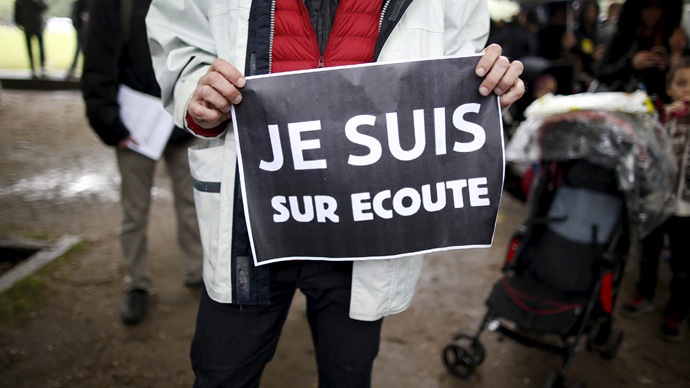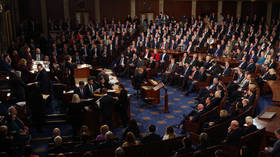‘France’s spy bill worse than US Patriot Act’

A surveillance law is pointless in terms of stopping terrorism and the recent attack in Texas has proved that, says Dave Lindorff, founder of This Can't Be Happening website. What this kind of law really does well is pick up everybody’s data, he adds.
This week the French parliament approved new surveillance rules allowing the government to spy on e-mails and phone calls of anyone linked to terror suspects, without authorization from a judge. Hundreds rallied in Paris against the new measure viewing it as the go-ahead for the government to spy on everyone's private lives.
RT:The French government says it needs the surveillance law to counter terrorism. Why are some people unwilling to accept that at face value?
Dave Lindorff: They have probably been reading and listening to news reports about how it’s working in the US where we’ve had the most unprecedented amount of this surveillance going on since 9/11 in 2001, and it has demonstrably failed to stop anything from happening. And even the officials have studied it and have concluded that it has been completely unsuccessful in preventing any kind of attack. Most recently of course we saw the evidence in Texas where you had probably the most obvious target of angry Muslims with that cartoon contest to draw [Prophet] Mohammed and the FBI failed abysmally to spot two guys who came with AKs and shot up the place. So it’s a pointless thing in terms of stopping terrorism, but what it does do very well is pick up just about everybody’s data.
READ MORE: French 'Big Brother'? MPs approve sweeping new surveillance powers
RT:Bulk data collection would bring France closer in line with the US and the UK. Is mass surveillance simply a reality that we're all going to have to accept?
DL: I don’t think we have to accept it but it’s a reality and there is a growing wave of concern about it all over the place where it’s happening. Certainly in the US there is a lot of pressure on Congress which is reconsidering renewal of the Patriot Act again in a fortnight. Interestingly, the most powerful opposition is coming in the House, which is run by Republicans, but there is a coalition of Libertarian leaning and genuine Conservatives, those who really take the Constitution at its word with progressives on the Democratic side who are trying seriously to curtail at least some of the worst abuses of the data collection.
RT:The French Prime Minister has rejected comparisons with the US Patriot Act. Do you think there are similarities?
DL: Of course there are, and that’s why he is rejecting the comparison - because everyone is outraged at what the NSA has been doing. So, he’s saying “Ours is different.” But it’s not different. In fact its worse in one sense than the Patriot Act expressly said and the NSA authorizations have expressly said that they are not allowed to use them for criminal investigations, therefore terrorism investigations. That has been bent and stretched by the Drug Enforcement Agency (DEA) and the FBI, but they still feel someway constrained to try to limit it to these terrorist cases whereas the French version that I read about is going to be used for criminal investigations. That gets very concerning because ‘criminal’ has an enormously broad definition and it can include political crimes.
‘There should be safeguards coming with these sweeping surveillance powers’
The French government is trying to use the emotion sparked by the Charlie Hebdo attack to fast-track the surveillance law avoiding any debate and distorting the truth about what it is really about says Felix Treguer co-founder of La Quadrature du Net.
RT:French officials insist they need new surveillance laws to prevent extremist attacks. Isn't that justification enough?
Felix Treguer: Of course there is a need for a legal framework for intelligence agencies to do their work and that implies fighting terrorism. But what we see in this context – the Paris attacks of a few months ago – the government is trying to use the emotion sparked by the January attacks to pass this law through a fast-track parliamentary procedure avoiding any debate and distorting the truth about what this bill is really about. It’s not just about terrorism; it allows the intelligence agencies to resort to surveillance for broad range of motives: scientific, economic espionage or monitoring social movements. So it’s really not just about terrorism and some of the measures really come down to legalizing mass surveillance. This is of course a very dangerous path.
READ MORE: French privacy advocates protest new spying laws (VIDEO)
RT:Should people be concerned about the new rules? How will the law affect a French person?
FT: Of course, and many people are [concerned], many people were demonstrating [on Monday] in spite of pretty bad weather in Paris. But the general opposition to the bill has been on the scene recently. It was not only Digital Rights Groups mobilizing against the law - they were joined by many NGOs, international organizations such as the UN, the UN reporters wrote op-eds against the bill, the Council of Europe, many French institutions as well. But what we had was the government basically not willing to engage in a constructive debate on the content of the bill and actually… the National Assembly which is the lower chamber of the Parliament in France adopted the bill by a sweeping majority.
RT:A poll last month suggested nearly two thirds of French people are in favor of restricted freedoms if that's what's needed to fight terrorism. If that's true, who exactly are you campaigning for?
FT: If you are going to ask the original question to people on the street they are going to respond to that, and again even more considering the stress and the difficult context of the Paris attacks and the general level of the terrorist threat. But when you look at the details of the bill, what it implies and also when you hear the technical arguments about for instance so-called ‘black boxes’ which are technical devices that have been installed by French intelligence services on the networks of telecommunications providers of web platforms to monitor and detect suspicious behavior online. Many engineering and computer experts explained that these so-called black boxes are completely ineffective, leading to false positives and investigative dead-ends. So of course if you ask this general question on the street you are going to have this kind of reply but I think we should be having a proper debate about the proportionality of the previsions of the bill and there need to be safeguards to come with these sweeping surveillance powers.
The statements, views and opinions expressed in this column are solely those of the author and do not necessarily represent those of RT.
The statements, views and opinions expressed in this column are solely those of the author and do not necessarily represent those of RT.












